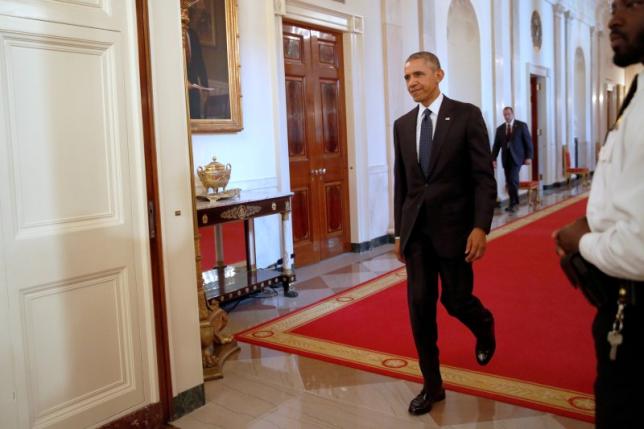Obama grapples with Vietnam arms ban, human rights on eve of trip
WASHINGTON: President Barack Obama is still grappling with a historic decision on whether to lift the US arms embargo on Vietnam just days before he travels there, the White House said on Thursday, signaling that human rights concerns could be a sticking point.
Support has grown within the US administration and on Capitol Hill to fully remove or at least further ease the ban on weapons sales, bolstering ties between former wartime enemies Washington and Hanoi to counter a rising China. But Obama also faces stiff opposition in some quarters.
Ending the embargo - something Vietnam has long sought - would sweep away one of the last major vestiges of the Vietnam War era as Obama makes his first trip there beginning on Monday.
It would also anger Beijing, which condemned Obama's partial lifting of the ban in 2014 as interference in the region.
The US deliberations come amid increased tensions in the disputed South China Sea. Beijing demanded an end to US surveillance in the area on Thursday after two of its fighter jets carried out what the Pentagon said was an "unsafe" intercept of a US military reconnaissance aircraft.
Ben Rhodes, Obama’s deputy national security adviser, said the administration has not yet finalized a decision on lifting the three-decade-old embargo but dodged a question on when – or even whether – an announcement might be made soon.
“It will be a subject of discussion with the Vietnamese,” he told reporters in a preview of Obama's trip, saying the president would explain his thinking to the country’s communist leadership. “It’s something that we obviously have been looking at … in the context of our broader relationship.”
White House officials made clear that the final decision would be linked in part to Vietnam’s human rights situation.
Concerns remain, especially among rights advocates and some US lawmakers, over the government's heavy-handedness toward political opponents and treatment of workers. There is also worry that Washington will lose some leverage if it gives up the arms embargo without securing concessions for reforms.
'UPGRADE' IN RELATIONSHIP
Still, some of Obama’s aides are mindful that a failure to satisfy Vietnam’s calls for rescinding the ban could inject a sour note into a visit meant to open a new chapter in security and economic relations. Some Vietnamese officials are suspicious that the United States seeks to undermine their one-party rule.
“What we want to demonstrate with this visit is a significant upgrade in the relationship between the United States and Vietnam as partners on many issues even as we have significant areas of difference,” Rhodes said.
Obama, who will make stops in Hanoi and Ho Chi Minh City, will meet Vietnam's new president, Tran Dai Quang, as well as its new prime minister, Nguyen Xuan Phuc, and Communist Party General Secretary Nguyen Phu Trong. He will also meet dissidents and will deliver a speech to the Vietnamese people, Rhodes said
US officials say that no matter the decision on the weapons ban they expect Obama’s visit to yield tangible steps to boost military cooperation. Washington is looking for increased port visits by US warships, possibly including access to the strategic port at Cam Ranh Bay, and to holding naval exercises, according to a person close to US thinking on the subject.






